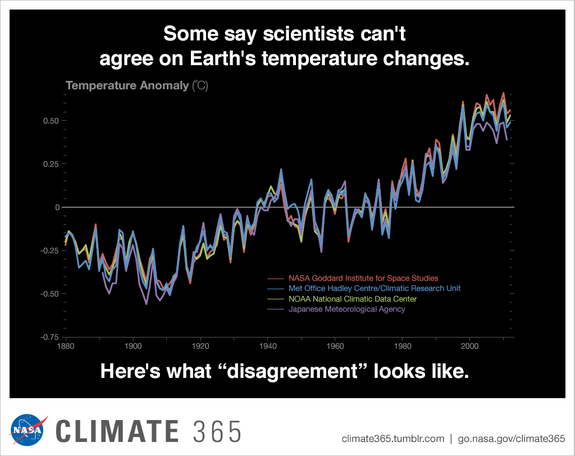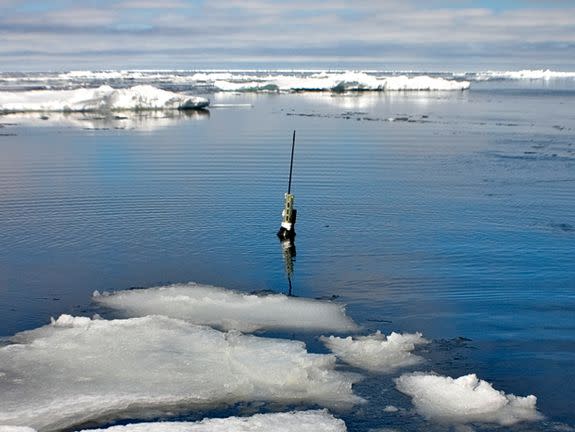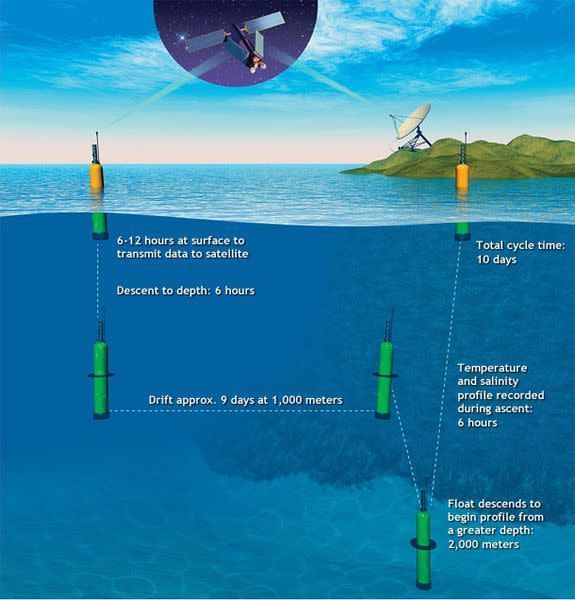The oceans, the true keepers of climate change, may meet our grimmest estimates

Earth, our ocean-dominated world, stores away a vast majority of the planet's accumulating heat in the seas.
In fact, over 90 percent of the planet's rising warmth — specifically trapped by human-created greenhouse gas emissions — is absorbed by the deep, salty waters.
For the last half-century, scientists have worked to put a more precise number on just how much heat the oceans take up each year, and for good reason: More heat absorption might provide evidence that our pale blue dot is increasingly sensitive to the heat-trapping carbon amassing in our atmosphere — which is likely at its highest levels in 15 million years.
And now, new research published in the scientific journal Nature supports the highest — or most problematic — of those ocean heat estimates.
"We found it's really in the top range of the estimates," Laure Resplandy, a Princeton University geoscientist who led the novel study, said in an interview.

Image: Nasa
Resplandy's research is a unique approach to gauging the accumulating warmth in the oceans. (There's a somewhat spotty record documenting that accumulation before 2007.)
Rather than measuring ocean waters directly with thermometers (which, of course, can't be done retrospectively), the oceanographers used records of how much of two common gasses — oxygen and carbon dioxide — were expelled specifically from the ocean over a 25-year period, between 1991 and 2016.
A warmer ocean holds fewer gases, noted Resplandy.
The results have stoked considerable interest in the scientific community, because they match with higher-end estimates of ocean warming over the past decades — which were based on directly measuring water temperatures.
"What’s significant is that it’s an independent, indirect measure that’s consistent with the direct measure," Dean Roemmich, a physical oceanographer at the Scripps Institution of Oceanography, said in an interview.
SEE ALSO: This scientist keeps winning money from people who bet against climate change
"But the best way of measuring ocean heat gain is directly with thermometers," added Roemmich, who had no involvement with the study.
Critically, Resplandy's results are considerably higher than the estimates accepted by the United Nations' Intergovernmental Panel on Climate Change (IPCC) — the global agency tasked with providing objective analyses of the societal impacts of climate change.
Often the IPCC — made up of diverse groups of scientists from around the globe — often "meet in the middle" to compromise on their final climate estimates, on topics ranging from future ocean temperatures to how staple crops might be impacted by warming climes.
Imagine all electricity we produce yearly. Multiply by 150. That's how much heat oceans absorb annually bc of #fossilfuel use. In @nature, our Ralph Keeling, fmr postdoc Laure Resplandy @Princeton, others on novel way they estimated that. https://t.co/FzLz3Tm0WM Pic: B. Jack Pan pic.twitter.com/qaGoMA72en
— Scripps Oceanography (@Scripps_Ocean) November 1, 2018
"It's a reminder that scientists, as a whole, are a little bit conservative — we don’t like to overstate things," Josh Willis, a NASA oceanographer who had no role in the study, said in an interview.
Many climate scientists and oceanographers, like Willis and Roemmich, were well aware that the ocean's warming could fall into the higher range of their estimates. Roemmich cites the American Meteorological Society's 2017 State of the Climate Report, which found high estimates that directly overlapped with Resplandy's results.
"There is not a significant disagreement here," said Roemmich.
"There’s plenty of papers that say the ocean is warming this fast — and this estimate is among those," added Willis.
But now, there's compelling research supporting these higher results. Though, like any new research, it's deserving of proper scrutiny.
"The issue here is that this independent measure found a rate of warming that’s on the high end — but this is a new piece of work," noted Willis. "It's going to need some scrutiny."
"But it's really exciting and interesting that it agrees so well with other [direct] measurements," he added.
And these direct measurements are getting better, said Roemmich.

Image: noaa
Since 2007, an international collaboration of 30 nations has unleashed a fleet of over 3,500 temperature-measuring buoys into the ocean. Called the Argo program, the devices take temperatures at different depths, mostly between 750 to 1250 meters (2460 to 4,100 feet).
The Argo fleet has been "one of the biggest steps forward in understanding climate-scale changes in the ocean,” Rick Lumpkin, a National Oceanic and Atmospheric Administration (NOAA) oceanographer, said in a statement.
Compared to our terrestrial world and ocean waters near the surface — which can be hit with extreme, record-breaking heat events — ocean temperatures in the dark, depths are less dramatic. But they add up.
"They are significant," said Roemmich. "You’re accumulating kilometers of water column. The rise is strongest at the sea surface, but it extends all the way to the ocean bottom."

Image: noaa
The accumulating heat in the ocean is consequential for a variety of reasons.
For one, as the authors argue, it raises implications for how Earth is responding to climate change, specifically that the planet could be quite sensitive to greenhouse gas emissions — or more sensitive than some widely-accepted estimates, like those of the IPCC.
Closer to the surface, more heat means greater odds of marine heat waves, which have been catastrophic to marine life in places like Australia's Great Barrier Reef.
Additionally, more heat means greater ocean expansion — just like heating up water in a pot. Naturally, this "thermal expansion" contributes to sea level rise — a real threat to the hundreds of millions of people inhabiting coastal areas.
Already, the planet is the warmest it's been in some 120,000 years, and now has the highest carbon dioxide levels — a potent greenhouse gas — in millions of years.
And as NASA's Willis has repeatedly emphasized, "Global warming is really ocean warming."
"If there's more heat coming into the system, it's going into the ocean," said Roemmich.
WATCH: Ever wonder how the universe might end?


